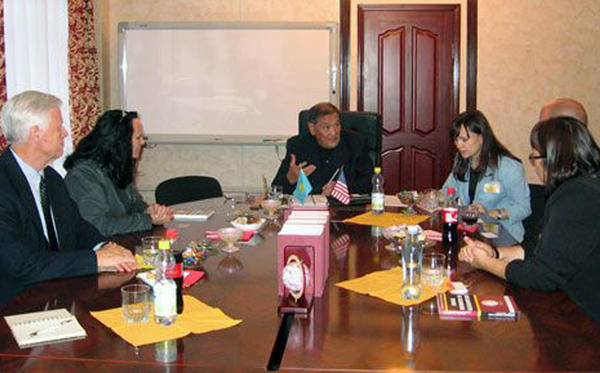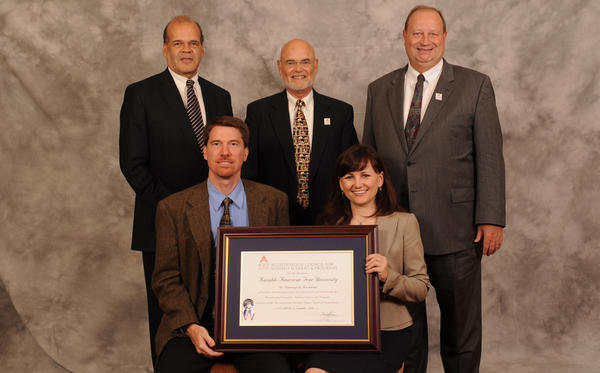International Accreditation of Higher Education in Kazakhstan

The education system in the Republic of Kazakhstan is undergoing fundamental changes and reforms, one of the objectives of which is to be fully integrated into the international educational realm. This is dictated by the need to train highly qualified and competitive specialists that meet high modern demands of the world market and are able to make a significant contribution to the development of Kazakhstan’s economy.
Quality standards enhancement
For the speedy integration of the higher education system of the country in the international educational space in a dynamically changing world it is necessary to raise the standards for the quality of educational services. The most common model of quality assurance in higher education is peer institutional and specialized accreditation. The former focuses on the overall educational activity of the institution, the latter aims to evaluate study programs. Both kinds of accreditation are based on the principles of voluntariness, independence, objectivity, openness, and transparency.
Accreditation of educational organizations is a procedure of recognition by an accreditation body of the compliance of educational services with the established requirements and standards in order to provide objective information about the quality of the educational services and confirm the use of effective mechanisms for their improvement.1

Kazakhstan’s education system, like most European higher education systems, is largely operated and controlled by the state through the Ministry of Education and Science. The educational institutions and programs receive their formal recognition directly from the state. However, with increasing autonomy, peer accreditation is considered a possible response to the need for the transfer of recognition from the state to autonomous entities that provide independent external quality evaluation. The impetus in this direction is determined in accordance with the Bologna Declaration. The Bologna Declaration seeks to establish a common European area of higher education, improving transparency, consistency and comparability of European higher education systems.
The educational institutions and programs receive their formal recognition directly from the state. However, with increasing autonomy, peer accreditation is considered a possible response to the need for the transfer of recognition from the state to autonomous entities that provide independent external quality evaluation.
National accreditation is the accreditation of educational organizations or programs by a national independent accreditation agency, while international accreditation is the accreditation of educational organizations or programs by a foreign accreditation agency. Any university of the Republic of Kazakhstan, along with the national accreditation, can apply for international accreditation in one of the international accrediting agencies. The preference is given to accreditation agencies formally recognized in Kazakhstan for compliance with quality standards and requirements, which is confirmed by the agency’s inclusion into the Kazakh National Register of Accreditation Agencies.2
World class leaders
Universities that chose the path of international recognition of study programs face a challenging task of selecting an accreditation agency. When KAFU was selecting and comparing different accreditation agencies in early 2006, Kazakhstan did not yet have the National Register of Accreditation Agencies, so KAFU relied on recommendations of respected international partners and partnering American universities.

The current accreditation system in the United States is nearly a century old and currently includes about hundreds of different accreditation organizations (agencies). International partners of KAFU recommend one of the most respected and recognized international agencies—the Accreditation Council for Business Schools and Programs.
In December of 2014, the Ministry of Education and Science of Kazakhstan followed the recommendation of the Republican Accreditation Council and decided to include ACBSP in the National Register of Accreditation Agencies. ACBSP’s decisions concerning accreditation of study programs at Kazakh higher education institutions are thus recognized by the Ministry. The listing of foreign accreditation agencies in the Kazakh national register is valid for five years; therefore, ACBSP is qualified to conduct program accreditation in Kazakhstan until December 2019. At the end of this period, the Kazakh Ministry will decide—on the basis of the reapplication of the agency—whether to prolong its registration.

KAFU became the first and only university in Kazakhstan to pass the full procedure of international accreditation by the ACBSP in 2010. Specialized accreditation of KAFU business programs was granted for a period of 10 years, including the following programs:
- Bachelor programs: Economics, Management, Finance, Public Administration and Local Management, Tourism, Information Systems
- Master programs: Management, MBA for Executives
- Ph.D. program in Management
It is surely difficult to be a pioneer in any process but the leadership and staff of the Business School of KAFU successfully accomplished this great task. International accreditation confirmed the compliance of KAFU to the highest international quality standards— strategic leadership, professional faculty and staff, effective teaching methods, high student learning outcomes and efficient business processes—all confirmed by the high demand for its graduates all around the world.
Kazakh-American Free University (Ust-Kamenogorsk, the Republic of Kazakhstan) is a private university of international partnership that was established in 1994 by a renowned educator and reformer, the former Minister of Education of Kazakhstan (1994-1996), Dr. Yerezhep Mambetkaziyev. President of the Republic of Kazakhstan Nursultan Nazarbayev participated in the first commencement ceremony in 1994 and in the first graduation ceremony in 2000. The leadership of the university and its faculty is very diverse and international. The mission of the university is to train future leaders of the 21 century for the good of the sovereign Republic of Kazakhstan.
1 Law of the Republic of Kazakhstan 319 of July 27, 2007, “On Education” http://bit.ly/HED1kaz139
2 http://bit.ly/HED1kazNRAA